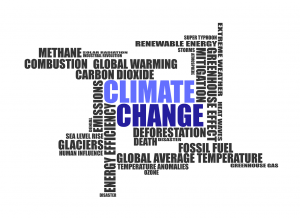The last few days of COP26 activity have been characterised by a focus on hard commitments that, if delivered, should ‘keep 1.5°C alive’. With a day focusing primarily on the youth voice, and the Global Day of Action falling on the weekend, the overarching theme of the last few days has been on doing more and talking less.
Young People Demand Action
Young climate leaders came together in Glasgow on Friday with negotiators, officials and ministers from across the world, making their voices heard and demanding the action needed to prevent catastrophic climate change in our lifetimes. Events across COP26 focused on harnessing the expertise of young people and putting their views directly to the negotiators and officials working to agree to global action on climate change.
The day was co-chaired by YOUNGO, the Official Children’s and Youth constituency of the UNFCCC which opened with a session called Unifying for Change: Global Youth voice at COP26.
YOUNGO also presented the COY16 Global Youth Position statement, representing the views of over 40,000 young climate leaders from across the world. The statement presented their priorities directly to Ministers, including action on climate finance, mobility and transportation, through to wildlife protection conservation.
Friday also saw criticism from climate activist Greta Thunberg. She said: "It should be obvious that we cannot solve a crisis with the same methods that got us into it in the first place.”
A few highlights from the day include:
- 23 countries make national climate education pledges including net-zero schools and putting climate at the heart of national curriculums
- Views of over 40,000 young climate leaders presented to ministers, negotiators and officials
- The UK also announced a new £85,000 research grant to support the Internal Displacement Monitoring Centre to produce better information on the education needs of refugee children and enable a more effective international response.
You can read more about the importance of the youth voice to university action here and the priorities and activities of YOUNGO here.
Leaders Commit to Halt and Reverse Forest Loss and Land Degradation
Saturday saw more announcements following The COP26 World Leaders Summit ‘Action on Forests and Land Use’ event, which brought together an unprecedented alliance of governments, companies, financial actors, and non-state leaders to raise ambition on forests and land-use. Over 134 leaders, accounting for more than 91% of the world’s forests, have committed to work together to halt and reverse forest loss and land degradation by 2030 in the Glasgow Leaders’ Declaration on Forests and Land Use.
Examples of national commitments aligned with this agenda include:
- Brazil’s plan to scale its ABC+ low carbon farming programme to 72m hectares, saving 1 billion tonnes of emissions by 2030
- Germany’s plans to lower emissions from land use by 25m tonnes by 2030
- The UK’s aim to engage 75% of farmers in low carbon practices by 2030.
The UK also announced funding of £500m to support the implementation of the Forest, Agriculture and Commodity Trade (FACT) Roadmap that was launched during the World Leaders Summit earlier this week, in which 28 countries are working together to protect forests while promoting development and trade. A further £65 million will support a ‘Just Rural Transition’ to help developing countries shift policies and practices to more sustainable agriculture and food production.
You can read more about the specific commitments in the areas of agricultural reform and innovation; sustainable production and consumption; and ocean protection here and here.
Global Day of Action
The purpose of the Global Day of Action is to unite all climate activists and groups around a common goal: to demand governments and corporations limit global temperatures to 1.5°C and deliver real and just solutions to the climate crisis.
Saturday’s Global Day of Action for climate change saw communities across the UK and beyond meet to protest unsustainable policy and practices impacting their local and wider environments. In Glasgow, roughly 100,000 people took part in a procession. We will likely see more coverage over the coming days of activity that took place across the UK and what impact it may have had.
UK Universities: Leaders in Climate Change
Over 1050 universities and colleges from 68 countries have pledged to half their emissions by 2030 and reach net-zero by 2050 at the very latest, impacting over 10 million students, notes the EAUC, the UK’s HE and FE sector sustainability champion. As values-driven organisations at the heart of their communities, UK Universities can make a significant contribution.
Iain Patton, CEO of EAUC said:
“As anchor, catalytic and cross-sector collaboration builders in our communities, institutions must take on a societal climate leadership role. It is our universities and colleges which have to be at the forefront of zero-carbon innovation, researching circular and clean production, teaching green skills and demonstrating innovative fossil-free campuses. The profile of universities and colleges committing to emissions reduction and net zero has never been higher. But with commitment, comes accountability and the Race to Zero brings this - allowing students to hold their institutions to account.”
Many UKUPC members are part of the COP26 University Network. This is a group of over 80 Universities and Research Facilities that are working collaboratively to promote a zero carbon and resilient future. By clicking on each member, you can find information on the valuable work being undertaken at universities across the UK.
The Network's mission is to ensure that the UK academic sector plays its role in delivering a successful COP26, getting all players on track to deliver a zero-carbon, resilient world.
The Network’s website notes, “…UK universities stand ready to collaborate and mobilise our capacities on issues relevant to the meeting and its build-up.”
The Network’s activity has focused on the following areas:
- Sharing and knowledge
- Communications and the media
- Partnerships and engagement
- Education and skills
- Net zero universities
- Cities level engagement
- Public engagement
- Expert subgroups
You can find a full list of members here and briefings from the group here.
For support with your sustainable procurement needs, contact Marisol Bernal at m.bernal@lupc.ac.uk.



